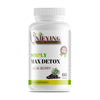Benefits and Uses of Ashwagandha
What is Ashwagandha?
Taking a closer look at what ashwagandha is and how it works, one will see that ashwagandha is a plant from India. It’s also known as Indian ginseng. Ashwagandha’s scientific name is Withania somnifera and belongs to the nightshade family of plants that includes tomatoes, bell and chili peppers, and tobacco.
This herb’s been used in traditional Ayurvedic medicine for thousands of years. In fact, it has so many benefits that several supplements today are made from its extracts.
If you want to know more about what these benefits are, keep reading.
How Does Ashwagandha Work?
Research shows that there are different ways by which ashwagandha works. The most common explanation of how it performs is by balancing our neurotransmitters or nervous system hormones. By doing so, stress is alleviated, and anxiety can be significantly reduced even if they're experienced on an ongoing basis.
How does Ashwagandha benefit me?
On an emotional level, ashwagandha can help balance your mood and improve your ability to overcome stress. Both anxiety and depression are thought to be linked to high levels of cortisol in the body, and ashwagandha is one of several supplements that can help reduce these symptoms by lowering cortisol levels over time. On a physical level, ashwagandha can benefit you by reducing inflammation and increasing muscle mass and bone density. It’s even been shown to slow cognitive decline. With so many health benefits, it’s hard to argue with getting more ashwagandha into your diet.
Ashwagandha contains a range of nutrients that may be ideal for supporting individual health goals. Ashwagandha also contains flavonoids, antioxidants, and essential minerals such as traces of calcium, iron, carotene and vitamin C all these help to support various biological functions in the body.
Are there any interactions with medications?
There are not currently any known drug interactions associated with ashwagandha capsules, although speaking to your physician if you have preexisting conditions before taking ashwagandha is encouraged. Ashwagandha may also interact badly with cholesterol-lowering medications like statins, since they both work on similar pathways in the body.
Who should avoid it?
While anyone could potentially experience adverse effects while taking ashwagandha, those who are pregnant or breastfeeding should not take ashwagandha capsules without consulting their doctor first. Side effects: If you’re feeling nauseous after taking ashwagandha (which some people do), try spacing out doses throughout the day rather than devoting yourself to multiples doses at once.
What form should I choose?
Extract vs. tincture vs. capsule, etc.: This will largely depend on personal preference. More natural forms, such as root powder or dried extract are available but may not provide quite as effective results compared to traditional encapsulated extracts. Capsules are probably the most accessible way to get your dose of ashwagandha though, so consider how you feel about consuming actual pills when determining which form is best for you. How much should I take? Dosage recommendations vary quite a bit depending on what sort of condition you’re trying to remedy with ashwagandha; however, experts tend agree that around 600mg per day seems to be standard for most people looking for general overall wellness benefits.
How do I take ashwagandha capsules?
The easiest way to take ashwagandha capsules is with a glass of water or milk, although some people choose to add them to their food. It’s important not to take ashwagandha capsules with juice or other beverages, as they can cause upset stomachs and intestinal discomfort. When taking ashwagandha capsules on an empty stomach, make sure you wait at least 30 minutes after eating before consuming another meal or snack.
This ratio ensures that your body absorbs all 60 trace minerals found in ashwagandha root powder. It’s also recommended that women consume 400mg per day while men consume 600mg per day for maximum benefits. If you experience any gastrointestinal problems when taking ashwagandha capsules, try reducing your dosage and spreading out your intake throughout the day. Consult with a healthcare professional if these issues persist.
Does ashwagandha have side effects?
In their natural form, ashwagandha supplements have no side effects. However, you should use caution if you have a chronic health condition or are taking any medications. Always talk to your doctor first if you’re thinking about starting a new supplement. As always, check with your doctor before adding a new supplement into your routine.








